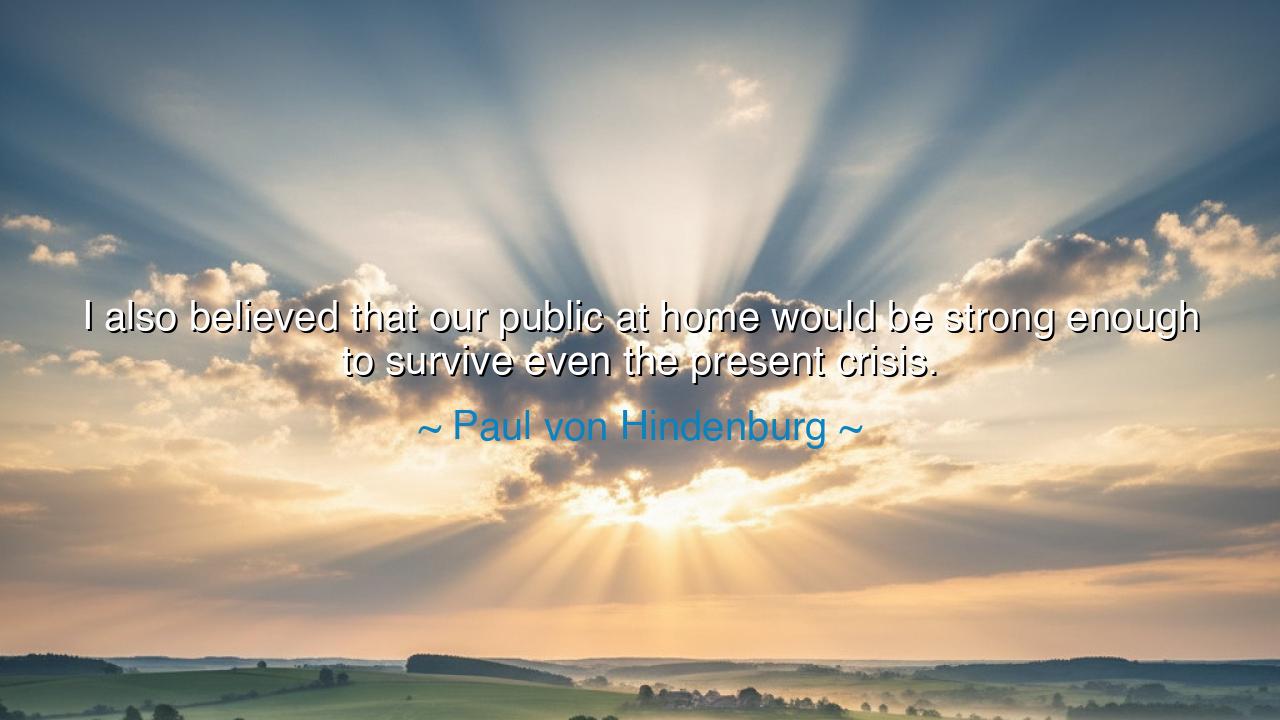
I also believed that our public at home would be strong enough to
I also believed that our public at home would be strong enough to survive even the present crisis.






“I also believed that our public at home would be strong enough to survive even the present crisis.” Thus spoke Paul von Hindenburg, a man forged in the furnace of war and history, whose words echo not only from a time of nations in turmoil, but from the eternal struggle of humankind to endure when the storm grows darkest. In these words, there beats a conviction older than any empire—the belief that a people’s spirit, though unseen, is stronger than the steel of armies, stronger than the tremors of fear, stronger than the ruin that may surround them. For the heart of a nation does not live in its palaces or battlefields, but in the quiet courage of its people at home, who stand unyielding while the winds of despair blow.
In the days of Hindenburg, Europe trembled beneath the thunder of the Great War, and later beneath the weight of its own broken promises. He, a soldier and statesman, had seen victory and ruin alike. His belief in endurance was not naïve—it was born from the ashes of loss and the weariness of men who had seen too much. When he spoke of “our public at home,” he meant not merely citizens, but the very foundation of civilization: the mothers who carried on in silence, the children who dreamed despite the hunger, the old who kept faith when others despaired. To believe that they could “survive even the present crisis” was to affirm the ancient truth—that though leaders may falter and empires fall, the spirit of the people endures.
In ancient times, too, the great generals and philosophers understood this. When Leonidas stood at Thermopylae, he knew the power of courage not only in warriors but in those who waited behind the walls of Sparta, praying, hoping, holding their breath through the days of slaughter. The soldiers at the front may win glory, but it is the endurance of the home that wins the war of the soul. A nation’s truest test comes not in its battles, but in the endurance of its citizens—their unity, their patience, their willingness to carry one another through the long winter of hardship.
So Hindenburg’s faith in the people was a form of heroism, though expressed not through sword or strategy, but through trust. For to believe in one’s people in the hour of despair is to see them as more than masses—it is to recognize their sacred potential. Yet his words also carry warning, for history teaches that such faith must be matched by wisdom. A nation’s endurance may be mighty, but when misled, it may also become the instrument of its own undoing. The same strength that sustains can also blind. Therefore, the wise must temper hope with vigilance, lest the fire that keeps them warm grow into a blaze that consumes.
Still, let us not lose the core of his message: that resilience is the truest wealth of any land. Political powers rise and crumble, but the soul that believes, endures. The strength to survive a crisis is not forged in comfort—it is tempered through sacrifice and shared hardship. Like the blacksmith’s iron, the human spirit grows stronger the more it is beaten by the hammer of trial. The public at home, though unseen by history’s eyes, carries the weight of civilization on its back. And when they do not yield, nations rise again from ruin.
Consider, too, our own age, filled with storms not of war but of confusion, isolation, and fear. The lesson remains: it is the unseen endurance of ordinary people that upholds the world. When a mother keeps faith though her days are dark, when a worker refuses despair though his labor seems endless, when a youth believes that tomorrow still holds light—these are the quiet victories that build the future. Hindenburg’s belief, stripped of politics, is a call to trust in the inner strength of humanity.
Therefore, O reader of later days, remember this teaching: never measure a people by their prosperity, but by their endurance in suffering. Strength is not the absence of pain, but the will to persist despite it. In times of crisis—whether of nations or of the heart—stand firm in the conviction that your spirit is greater than your circumstance. Speak courage into others. Keep the fire alive in your home, in your work, in your heart. For as Hindenburg believed, and as the ancients knew, those who endure in silence shape the destiny of the world. Empires may crumble—but the human soul, steadfast and believing, survives every crisis.






AAdministratorAdministrator
Welcome, honored guests. Please leave a comment, we will respond soon